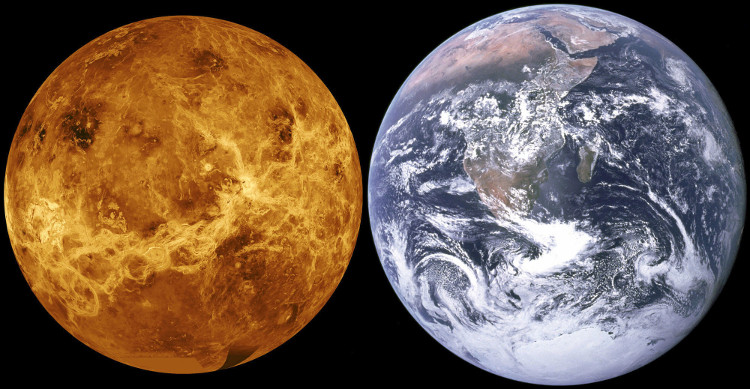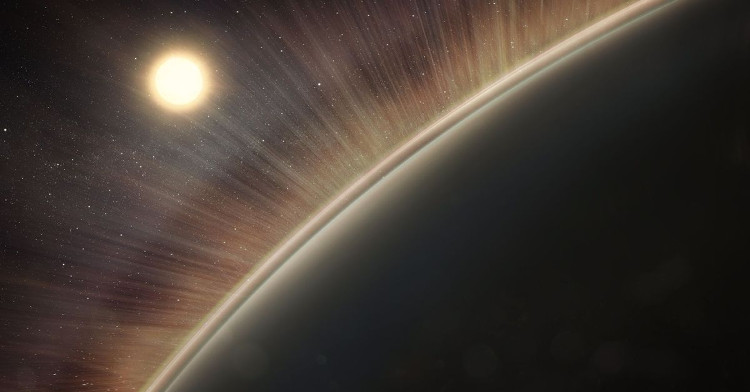Venus also had water, but was sucked in by a
Not only Mars, but Venus also had water on it. And so far, experts have found the reason why water disappears.
In the solar system, Venus is the most Earth-like planet. Except that the planet is 10 times hotter than Earth, the size and gravity of both are almost identical.
However, Venus may have been more like Earth before, because it had water. Experts believe the planet once had giant oceans, because its atmosphere contains deuterium - an isotope of hydrogen in the ocean on Earth.

Venus is like the sister of Earth, except without water.
But anyway, right now, this planet certainly cannot sustain life, because all the water has disappeared. And now, experts have figured out why.
Where did the water on Venus go?
The first explanation that many people make is simply that water on Venus has evaporated, because the planet's temperature is 10 times greater than Earth.
But if so, the water molecules must be very much in the atmosphere. Over here, Venus's atmosphere is 100,000 times less water than Earth.
So the experts gave another explanation, that the Sun's winds blew away all the steam on Venus.

Venus's atmosphere is 100,000 times less water than Earth.
However, according to the latest research published in Geophysical Research, the solar wind is not the culprit, it is actually ionic winds - also known as electric wind on the planet's surface. .

On Venus, ionic winds are five times stronger than Earth, with a voltage of up to 10 volts.
Ion ions are currents of ions that move continuously and continuously, impacting with molecules in the air, forming wind. Wind ions on Earth also exist, but the impact has never been significant.
On Venus, ionic winds are five times more powerful than the Earth, with a voltage of up to 10 volts."We recognize the charged wind, which only exists in machines on Earth, is the demon that drains water on Venus," said researcher Glyn Collinson .

Kim's ionic wind is the devil that drains water.
Experts still don't know why the ionic winds here are so powerful, but probably because the planet is so close to the Sun.
What does research mean?
Scientists believe that this finding is very important in the exploration of the universe, but more specifically, discovering planets within our solar system.

NASA intended to build a floating base on Venus.
Venus is one of the leading candidates for the human migration process. Although the planet's surface is very hot, it is possible to build bases only in the atmosphere.
However, this new finding will make the plan for traveling Venus go bankrupt. According to Glyn A. Collinson - NASA expert:
"It's amazing. We never thought that ionic winds could be so powerful that it would wipe the planet's oxygen out of space."
- Venus can stay?
- The ocean may exist on Venus on Earth about 700 million years ago
- Overview of Venus
- NASA concussion statement about Venus
- NASA wants to bring people to Venus
- Venus Experss are about to plunge into the Venusian atmosphere
- Venus is about to be a
- After 8 years of Venus exploration, Venus Express has run out of fuel
- 10 most interesting things about Venus
- Plan to conquer human Venus
- Video: Unusual midnight in hell Venus
- Venus has volcanic eruptions
 Van Allen's belt and evidence that the Apollo 11 mission to the Moon was myth
Van Allen's belt and evidence that the Apollo 11 mission to the Moon was myth The levels of civilization in the universe (Kardashev scale)
The levels of civilization in the universe (Kardashev scale) Today Mars, the sun and the Earth are aligned
Today Mars, the sun and the Earth are aligned The Amazon owner announced a secret plan to build a space base for thousands of people
The Amazon owner announced a secret plan to build a space base for thousands of people Rare photos from the surface of Venus
Rare photos from the surface of Venus  Magical 'events' not to be missed in the night sky in 2025
Magical 'events' not to be missed in the night sky in 2025  The Truth About the Solar System's 3rd Habitable Planet
The Truth About the Solar System's 3rd Habitable Planet  Is there evidence of life on Venus? Scientists discover unbelievable facts!
Is there evidence of life on Venus? Scientists discover unbelievable facts!  Engine helps the plane reach Mach 6 speed
Engine helps the plane reach Mach 6 speed  New discovery on Venus: Two volcanoes erupting lava!
New discovery on Venus: Two volcanoes erupting lava! 